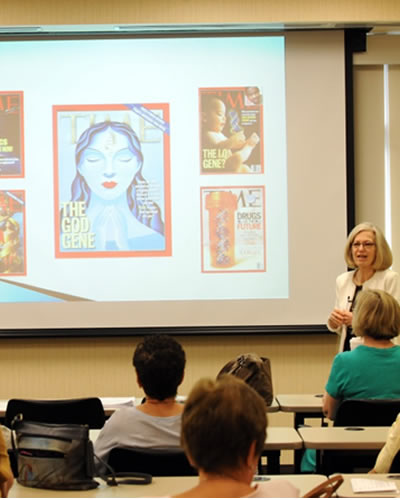July 12, 2018

In 2015, the University of Maryland School of Medicine (UMSOM) expanded its Mini-Med School Program to seniors. The “Seniors Medical Symposium,” is a 6-week lecture series designed for Baltimore adult seniors who are interested in the latest advances in medicine.
On May 29, the fourth annual Seniors Medical Symposium concluded with a class on medical genetics presented by Miriam G. Blitzer, PhD, Professor of Pediatrics and Division Head of Human Genetics. Dr. Blitzer is recognized as a national leader in medical genetics education and training. She has authored over 60 publications and has coordinated the medical genetics and genomics curriculum for first year medical students at UMSOM.
“Genetics influences virtually every aspect of our lives, our bodies, our health – your individual genome is like your own personal ‘blueprint’,” said Dr. Blitzer. UMSOM faculty presenters for this year’s Seniors Medical Symposium also included Joseph Scalea, MD, Assistant Professor of Surgery, Charles B. Simone, II, MD, Associate Professor of Radiation Oncology and Medical Director of the Maryland Proton Therapy Center, Lawrence Adler, MD, Clinical Assistant Professor of Psychiatry, Zubair Ahmed, PhD, Professor of Otorhinolaryngology-Head & Neck Surgery and Muhammad Mohiuddin, MBBS, Professor of Surgery and Director of the Cardiac Xenotransplantation Program.
Dr. Scalea, also the Director of Pancreas and Islet Cell Transplantation at the University of Maryland Medical Center (UMMC), opened the symposium on April 17 with a presentation on cell and pancreas transplantation for the treatment of diabetes. The University of Maryland Pancreas Transplant Program is among the top 15 programs in the country, performing between 15 and 25 pancreas transplants each year. “While only a small percentage of those with diabetes need a pancreas transplant, our goal is to identify and provide this lifesaving service for those patients,” said Dr. Scalea. “The University of Maryland has been a bastion for pancreas transplantation for a very long time, and I hope to continue to build on that tradition of success.”
Similarly, the Maryland Proton Treatment Center (MPTC) is the first center in the Baltimore-Washington region to offer proton therapy to treat cancer. As Medical Director of the Maryland Proton Therapy Center, Dr. Simone participates in the development of clinical trials and research protocols, while ensuring the full integration of MPTC with the Radiation Oncology Department, The University of Maryland Marlene & Stewart Greenebaum Comprehensive Cancer Center, the University of Maryland Medical Center/System, and the UMSOM. On April 24, Dr. Simone shared the latest advances in proton therapy treatment. “Clinical trials are ongoing to better define which patients benefit most from proton therapy,” said Dr. Simone. “With proton therapy, we can treat more complex tumors, avoid unwanted side effects, and reduce damage to healthy tissues.”
On May 1, Dr. Adler shared some of the challenges in assessment and diagnosis in mental disorders in older adults. “Stereotypes about normal aging can make diagnosis and assessment of mental disorders in late life challenging,” said Dr. Adler. As a researcher, Dr. Adler has been an investigator and a co-investigator on over 100 clinical trials sponsored by the National Institute of Mental Health and many major pharmaceutical companies. Dr. Adler is board-certified in General Psychiatry and in Geriatric Psychiatry, and is a Certified Physician Investigator.
Dr. Ahmed presented on May 8 and shared some of the current technologies for genetic testing for hearing loss and potential options for treatment. “Genetic diagnosis has traditionally been difficult due to extreme genetic heterogeneity. Applications of next-generation sequencing technologies are now beginning to enter the clinical practice,” said Dr. Ahmed. Dr. Ahmed’s research is focused on understanding how the retinal and inner ear sensory epithelia develop and function. Dr. Ahmed’s scientific accomplishments have earned several national and international awards, including Career Development Award by the RPB Foundation and a Medal of Honor by the President of Pakistan.
Dr. Mohiuddin is best known for his 2016 breakthrough trial where he and his team maintained the survival of modified pig hearts transplanted into simian models for an unprecedented mean of 433 days, with one lasting 945 days—almost two and half years—breaking all previous pig-to-primate heart transplant records. On May 22, Dr. Mohiuddin presented on xenotransplantation and how it will change the future of transplant surgery. “Today, nearly 100,000 people are awaiting transplants nationwide. Xenotransplantation may be able to provide an unlimited supply of organs to patients,” said Dr. Mohiuddin.
Over 25 seniors registered for this year’s program, many of whom have backgrounds in medicine, pharmacy, and nursing. “This is my fourth year and each year the program gets better,” said one participant, a retired nurse from Owings Mills.
“As a result of these experiences through our Mini-Med School programs, we hope our Baltimore neighbors will be better able to understand, appreciate, and benefit from the many advances that are emerging in medicine and research,” said E. Albert Reece, MD, PhD, MBA, Executive Vice President for Medical Affairs, UM Baltimore, and the John and Akiko K. Bowers Distinguished Professor and Dean of the School of Medicine.
The National Institute of Health pioneered the concept of the mini-medical school to educate local participants on today's healthcare issues, thereby increasing the community's understanding of the worlds of science and medicine. The Seniors Medical Symposium is one of many UMSOM Mini-Med School programs, including a summer program for Baltimore City youth “Mini-Med for Kids” at the Franklin Square’s Salvation Army’s Boys and Girls Club, and the UMSOM first Mini-Med School program, which began in 2001.
The 18th annual Mini-Med School program will begin on October 16, offering a collection of pertinent educational sessions on the topics of hypertension, exercise, nutrition, social justice, stress, and much more.
Contact
Office of Public Affairs
655 West Baltimore Street
Bressler Research Building 14-002
Baltimore, Maryland 21201-1559
Contact Media Relations
(410) 706-5260
